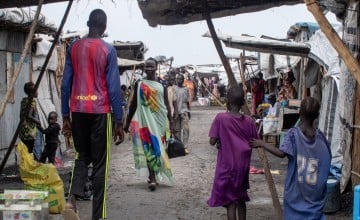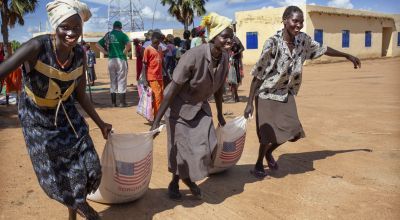
Read our 2024 annual report

Knowledge Hub
“When I came here, I was hopeless. I did not see any sign of life in the baby. She had no energy at all. She had lost a lot of water from her body.”
Nyacanya has just walked six hours to save her grandchild’s life. Leaving the crowded camp behind, she followed the dirt road cutting through the flooded landscape, carrying two-year-old Liakuoth in her arms.
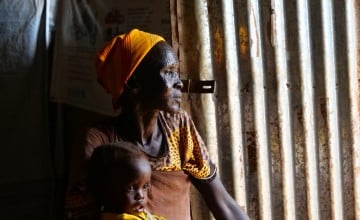
South Sudan, the world’s youngest country, has struggled in its infancy. Since gaining independence in 2011, the people of South Sudan have endured chronic conflict and insecurity.
An unnatural island
In Unity State, four years of flooding has transformed the landscape into an archipelago, with communities huddled on pockets of higher ground. The biggest community did not form naturally but was thrown together by violent circumstance. Visible by satellite as an almost perfectly square island, the Bentiu IDP camp floats in the vast sea of flood water.
In 2013, as civil war raged across the country, tens of thousands of civilians converged on a United Nations Peacekeeping base outside the town of Bentiu, looking for protection from massacre. As the threat of violence persisted, the people remained, and a camp formed, surrounded on four sides by soil embankments.
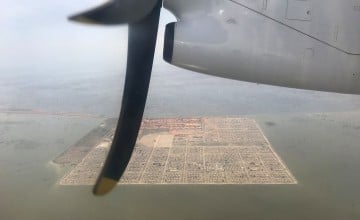
Today, about 109,000 people live there, crowded into dense rows of tukuls - basic shelters constructed in the traditional style, with branches and reeds, but topped with NGO-issued tarpaulin. Nyacanya and Liakuoth live there. They are among the estimated two million South Sudanese displaced inside their own country.
Concern and the European Union
“Because of the living conditions in the camp, the child was never healthy. She was having constant diarrhoea,” Nyacanya says. “She was not even playing with other children. At the same time, the child never received proper healthcare. When I saw this, I decided to come with her here.”
Nyacanya is sitting on a ground mat inside the Kuach Primary Health Care Centre, operated by Concern in partnership with the European Union. She is exhausted after her journey, but relieved that Liakuoth is receiving treatment.
“When I was coming with the baby here, I was very nervous. She was suffering from severe diarrhoea and vomiting. She was losing a lot of water from her body. I was worried that she would pass away and not make it to the health centre.”
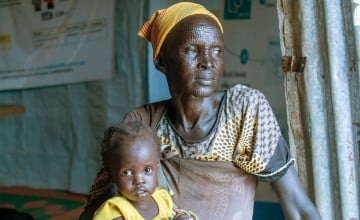
With the support of the European Union, Concern operates five Primary Health Care Centres in South Sudan. About 25,000 people are cared for in these facilities every year, including the treatment of nearly 4,000 malnourished children aged under five.
Other services provided at the centres include immunisation for children, antenatal care, safe deliveries by trained midwives, hygiene and nutrition information for caregivers, and cooking classes.
“To be honest, when I arrived here, I never expected her to receive the kind of services she received. I thought she would be treated as an outpatient, given some medicine and then sent back home. But when I came, the health worker welcomed me, performed some blood tests on the baby, and they also gave her therapeutic milk. They also gave us soap for washing, a bed to sleep in, and we had access to electricity. I am so happy. I believe that the baby will get better.”
An incubator for disease
This area of South Sudan has always experienced seasonal flooding, but in recent years the flood waters have refused to recede. Unity State has become the perfect incubator for disease. As well as limited health care facilities, people lack access to clean water, for both drinking and washing. Without functional toilets, people resort to open defecation. Mosquitos thrive in wet environments. In these conditions, cases of diarrhoea, malaria, and pneumonia increase dramatically.
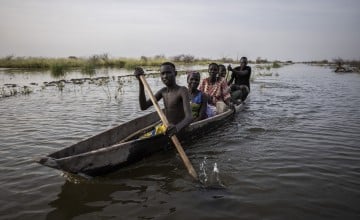
“Before the flooding, we did not have all these challenges,” says Nyacanya. “We could harvest from the farm, and the cows would give us milk. Since the flooding, we have lost our cattle, and now the children do not get any milk. When we run out of food, we eat the roots of the water lily, which is not good for babies.”
When families lose farming land and livestock, parents struggle to feed their children. Between July 2024 and June 2025, an estimated 2.1 million children in South Sudan suffered acute malnutrition.
Liakuoth is recovering. Her grandmother is preparing for the long walk back to the camp.
“I am hoping she will continue to get healthier and not relapse,” Nyacanya says. “The Concern health centre is the only one where we can get the services we need. If not for Concern, so many lives would have been lost to disease and malnutrition.”
Names have been changed
